Learning about various aspects of the GROWMARK system and where they might best fit is the goal of the company’s associate program and Heather Miller is working into her third rotation in the program this summer.
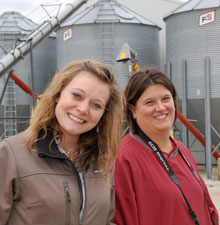 Heather, pictured here on the left with GROWMARK Publications and News Specialist Karen Jones, has already spent six months in corporate communications, is currently working in government affairs, and will finish her 18-month associate program with a stint in marketing. “My very first project with GROWMARK was the re-design of GROWMARK.com. We hadn’t done anything with our website since ’95 when it launched so it was desperately in need of a face lift. ” Heather told me during the company’s media day recently. “That was a great first experience coming into the company because I got to learn a little bit about everything that we do.” Heather also worked on the launch of some of GROWMARK’s social media strategies.
Heather, pictured here on the left with GROWMARK Publications and News Specialist Karen Jones, has already spent six months in corporate communications, is currently working in government affairs, and will finish her 18-month associate program with a stint in marketing. “My very first project with GROWMARK was the re-design of GROWMARK.com. We hadn’t done anything with our website since ’95 when it launched so it was desperately in need of a face lift. ” Heather told me during the company’s media day recently. “That was a great first experience coming into the company because I got to learn a little bit about everything that we do.” Heather also worked on the launch of some of GROWMARK’s social media strategies.
In the government affairs division, Heather has been able to see how GROWMARK takes an interest on behalf of its members in legislative and regulatory action on both the state and national level. “We’re not just going to ag committee hearings. We have arms in energy, we do transportation issues, we cover a lot of labor and workplace environment issues,” she said.
Heather has an agricultural background and interned with GROWMARK in 2009 prior to being hired full time in June 2010. “The GROWMARK internship is a really excellent program,” she said. “We have about 50 interns every year and about a 70 percent retention rate – about 70 percent of interns then come back to be full time employees at GROWMARK after they graduate.”
Learn more about Heather and the GROWMARK intern and associate program here: Heather Miller Interview



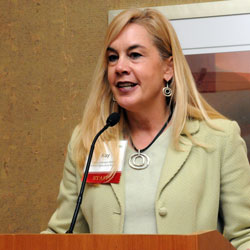 I got Kay Johnson Smith, Executive Vice President, Animal Agriculture Alliance, to wrap things up from the Stakeholders Summit. She says that the speakers focused on positive, proactive ways “we can reach the public and invite them in to our businesses without jeopardizing bio-security and food safety concerns.” She mentioned one speaker from a company that has
I got Kay Johnson Smith, Executive Vice President, Animal Agriculture Alliance, to wrap things up from the Stakeholders Summit. She says that the speakers focused on positive, proactive ways “we can reach the public and invite them in to our businesses without jeopardizing bio-security and food safety concerns.” She mentioned one speaker from a company that has 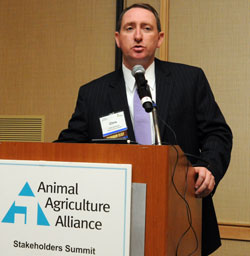 The new Chair of the Animal Agriculture Alliance is Dr. Chris Ashworth,
The new Chair of the Animal Agriculture Alliance is Dr. Chris Ashworth, 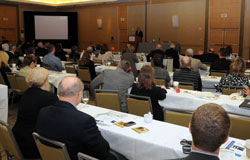 What is the perception of farmers and ranchers? That’s the broader question that was being addressed by participants at the Animal Agriculture Alliance Stakeholders Summit according to Mary Kay Thatcher,
What is the perception of farmers and ranchers? That’s the broader question that was being addressed by participants at the Animal Agriculture Alliance Stakeholders Summit according to Mary Kay Thatcher, 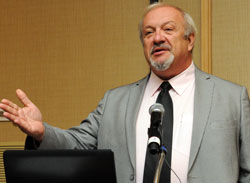 At the Animal Agriculture Alliance Stakeholders Summit we got an international lesson from Jim Sumner, President,
At the Animal Agriculture Alliance Stakeholders Summit we got an international lesson from Jim Sumner, President, 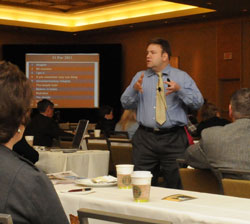 Safer, healthier, convenient and cleaner. Those are words that Frank Luntz,
Safer, healthier, convenient and cleaner. Those are words that Frank Luntz, 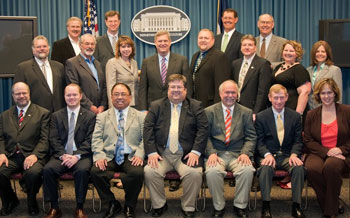
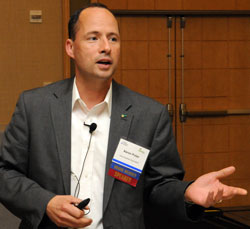 Soybeans came up on the program at the Animal Agriculture Alliance Stakeholders Summit in the form of Aaron Putze, Director External Relations,
Soybeans came up on the program at the Animal Agriculture Alliance Stakeholders Summit in the form of Aaron Putze, Director External Relations,